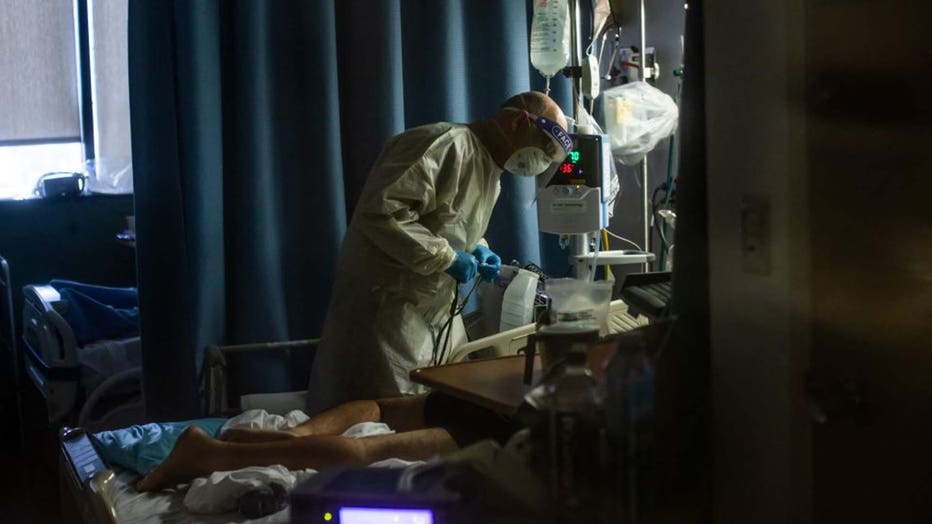Study: 80% of COVID-19 patients suffer 1 or more long-term effects
A recent study published in the journal "Nature" found that 80% of people who were infected with COVID-19 will experience at least one or more of the long-term effects associated with the virus.
The study, which was published on Sept. 9, defines long-term COVID-19 as any case lasting longer than 14 to 110 days post-infection.
"Symptoms, signs, or abnormal clinical parameters persisting two or more weeks after COVID-19 onset that do not return to a healthy baseline can potentially be considered long-term effects of the disease," according to the study.
Researchers observed data from 18,251 publications from all over the world.

FILE - A doctor checks on a 34-year-old unvaccinated COVID-19 patient.
RELATED: Fully vaccinated people half as likely to develop long-term COVID-19, study suggests
The five most commonly experienced long-term COVID-19 symptoms were fatigue (58%), headache (44%), attention disorder (27%) hair loss (25%) and dyspnea (24%), which is also known as labored breathing, the study said.
Other more severe long-term symptoms were related the lungs such as coughing, chest discomfort, reduced ability for blood to take in oxygen, sleep apnea and pulmonary fibrosis, the study said.
Some patients also experienced cardiovascular symptoms like heart arrhythmias and heart inflammation, as well as neurological symptoms such as dementia, depression, anxiety, attention disorder and obsessive-compulsive disorders.
Researchers highlighted that fatigue was more common in females and noted that one study reported that post-activity polypnea and alopecia were more common in females also.
RELATED: Long COVID-19: Can children suffer long-term symptoms after infection?
While the study observed patients from ages 17 to 87, researchers noted further study needs to be done to better understand and categorize the demographic of people who are suffering from long COVID-19. Researchers also noted that observations into the mental health of people recovering from the novel coronavirus are needed.
"Multi-disciplinary teams are crucial to developing preventive measures, rehabilitation techniques, and clinical management strategies with whole-patient perspectives designed to address long COVID-19 care," according to researchers.
Studies on long COVID-19 have been ongoing as the pandemic enters its second year and researchers are learning more about the aftermath of being infected with COVID-19.
A study published in April and conducted by the Veterans Health Administration found long-lasting symptoms and an increased risk of death in about 8-10% of COVID-19 patients that participated.
RELATED: Covid long-hauler who lost sense of taste and smell receives help at Henry Ford
The study also revealed that people who were infected with COVID-19 but did not require hospitalization still had a higher chance of suffering the lingering side effects and increased risk of death.
According to Dr. Ziyad Al-Aly, the chief of research and development at the St. Louis VA Healthcare System who co-authored the study, 8-10% of COVID-19 survivors "started showing an increased risk of diabetes, increased risk of lung problems, increased risk of heart problems, with heart failure, acute heart disease, increased risk of some brain problems including stroke and memory loss, increased risk of blood clots."
"What we also observed, there was a significant increase in the risk of mental health disorders, including higher risk of depression, anxiety and substitute disorder," Al-Aly explained. "So what that tells us, it really tells us that post-COVID — or long COVID — isn’t really one thing. It’s not only really fatigue or shortness of breath or cough. Long COVID can literally affect any organ in the body."
In July, a study published in the medical journal "The Lancet" found more than 200 symptoms affecting 10 organ systems associated with the novel coronavirus.
RELATED: Long-term side effects from COVID vaccines unlikely, data shows
While the U.S. Centers for Disease Control and Prevention says most people recover from COVID-19 after two weeks, the 3,762 respondents of "The Lancet" study took longer than 35 weeks on average to recover from the virus.
Researchers said fatigue was the most common symptom, in some cases lasting up to six months. Cognitive dysfunction and post-exertional malaise — the worsening of symptoms following minor physical or mental exertion — were also among the most commonly observed symptoms.
Eighty-eight percent of respondents reported a decline in cognitive dysfunction or memory issues.
"Patients with Long COVID report prolonged, multisystem involvement and significant disability," study authors wrote. "By seven months, many patients have not yet recovered (mainly from systemic and neurological/cognitive symptoms), have not returned to previous levels of work, and continue to experience significant symptom burden."
RELATED: Kidney issues linked to ‘long COVID-19,’ study finds
While there is still much to learn about the rapidly evolving virus and long-term COVID-19 conditions, the CDC said the best way to prevent infection is by getting vaccinated as soon as possible.
"Rapid and multi-year studies are underway to further investigate post-COVID conditions. These studies will help us better understand post-COVID conditions and how to treat patients with these longer-term effects," the agency states on its website.
"To maximize protection from the Delta variant and prevent possibly spreading it to others, get vaccinated as soon as you can and wear a mask indoors in public if you are in an area of substantial or high transmission," it adds.
Jordan Smith, Austin Williams and Kelly Taylor Hayes contributed to this report.


